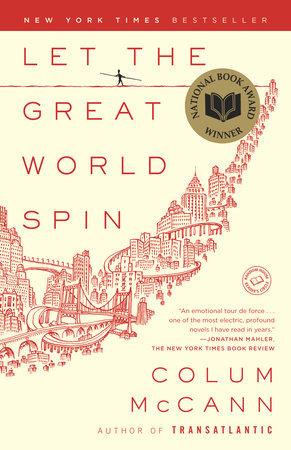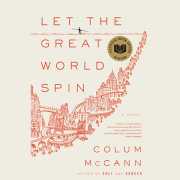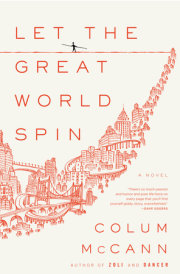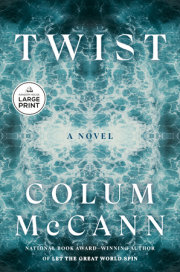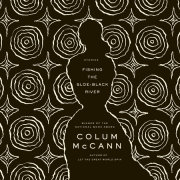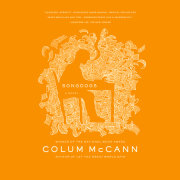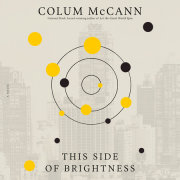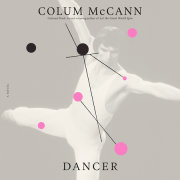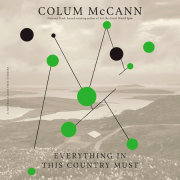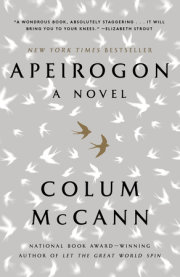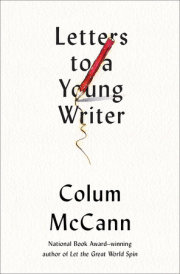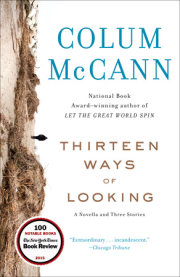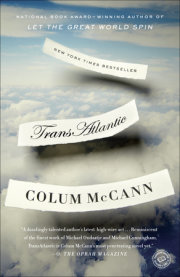Those who saw him hushed. On Church Street. Liberty. Cortlandt. West Street. Fulton. Vesey. It was a silence that heard itself, awful and beautiful. Some thought at first that it must have been a trick of the light, something to do with the weather, an accident of shadowfall. Others figured it might be the perfect city joke–stand around and point upward, until people gathered, tilted their heads, nodded, affirmed, until all were staring upward at nothing at all, like waiting for the end of a Lenny Bruce gag. But the longer they watched, the surer they were. He stood at the very edge of the building, shaped dark against the gray of the morning. A window washer maybe. Or a construction worker. Or a jumper.
Up there, at the height of a hundred and ten stories, utterly still, a dark toy against the cloudy sky.
He could only be seen at certain angles so that the watchers had to pause at street corners, find a gap between buildings, or meander from the shadows to get a view unobstructed by cornicework, gargoyles, balustrades, roof edges. None of them had yet made sense of the line strung at his feet from one tower to the other. Rather, it was the manshape that held them there, their necks craned, torn between the promise of doom and the disappointment of the ordinary. It was the dilemma of the watchers: they didn’t want to wait around for nothing at all, some idiot standing on the precipice of the towers, but they didn’t want to miss the moment either, if he slipped, or got arrested, or dove, arms stretched.
Around the watchers, the city still made its everyday noises. Car horns. Garbage trucks. Ferry whistles. The thrum of the subway. The M22 bus pulled in against the sidewalk, braked, sighed down into a pothole. A flying chocolate wrapper touched against a fire hydrant. Taxi doors slammed. Bits of trash sparred in the darkest reaches of the alleyways. Sneakers found their sweetspots. The leather of briefcases rubbed against trouserlegs. A few umbrella tips clinked against the pavement. Revolving doors pushed quarters of conversation out into the street. But the watchers could have taken all the sounds and smashed them down into a single noise and still they wouldn’t have heard much at all: even when they cursed, it was done quietly, reverently. They found themselves in small groups together beside the traffic lights on the corner of Church and Dey; gathered under the awning of Sam’s barbershop; in the doorway of Charlie’s Audio; a tight little theater of men and women against the railings of St. Paul’s Chapel; elbowing for space at the windows of the Woolworth Building. Lawyers. Elevator operators. Doctors. Cleaners. Prep chefs. Diamond merchants. Fish sellers.
Sad- jeaned whores. All of them reassured by the presence of one another.
Stenographers. Traders. Deliveryboys. Sandwichboard men. Cardsharks. Con Ed. Ma Bell. Wall Street. A locksmith in his van on the corner of Dey and Broadway. A bike messenger lounging against a lamppost on West. A red- faced rummy out looking for an early- morning pour. From the Staten Island Ferry they glimpsed him. From the meatpacking warehouses on the West Side. From the new high- rises in Battery Park. From the breakfast carts down on Broadway. From the plaza below. From the towers themselves.
Sure, there were some who ignored the fuss, who didn’t want to be bothered. It was seven forty- seven in the morning and they were too jacked up for anything but a desk, a pen, a telephone. Up they came from the subway stations, from limousines, off city buses, crossing the street at a clip, refusing the prospect of a gawk. Another day, another dolor. But as they passed the little clumps of commotion they began to slow down.
Some stopped altogether, shrugged, turned nonchalantly, walked to the
corner, bumped up against the watchers, went to the tips of their toes, gazed over the crowd, and then introduced themselves with a
Wow or a
Gee- whiz or a Jesus H. Christ.
The man above remained rigid, and yet his mystery was mobile. He stood beyond the railing of the observation deck of the south tower–at any moment he might just take off.
Below him, a single pigeon swooped down from the top floor of the Federal Office Building, as if anticipating the fall. The movement caught the eyes of some watchers and they followed the gray flap against the small of the standing man. The bird shot from one eave to another, and it was then the watchers noticed that they had been joined by others at the windows of offices, where blinds were being lifted and a few glass panes labored upward. All that could be seen was a pair of elbows or the end of a shirtsleeve, or an arm garter, but then it was joined by a head, or an odd- looking pair of hands above it, lifting the frame even higher. In the windows of nearby skyscrapers, figures came to look out–men in shirtsleeves and women in bright blouses, wavering in the glass like funhouse apparitions.
Higher still, a weather helicopter executed a dipping turn over the Hudson–a curtsy to the fact that the summer day was going to be cloudy and cool anyway–and the rotors beat a rhythm over the warehouses of the West Side. At first the helicopter looked lopsided in its advance, and a small side window was slid open as if the machine were looking for air. A lens appeared in the open window. It caught a brief flash of light. After a moment the helicopter corrected beautifully and spun across the expanse. Some cops on the West Side Highway switched on their misery lights, swerved fast off the exit ramps, making the morning all the more magnetic.
A charge entered the air all around the watchers and–now that the day had been made official by sirens– there was a chatter among them, their balance set on edge, their calm fading, and they turned to one another and began to speculate, would he jump, would he fall, would he tiptoe along the ledge, did he work there, was he solitary, was he a decoy, was he wearing a uniform, did anyone have binoculars? Perfect strangers touched one another on the elbows. Swearwords went between them, and whispers that there’d been a botched robbery, that he was some sort of cat burglar, that he’d taken hostages, he was an Arab, a Jew, a Cypriot, an IRA man, that he was really just a publicity stunt, a corporate scam,
Drink more Coca- Cola, Eat more Fritos, Smoke more Parliaments, Spray more Lysol, Love more Jesus. Or that he was a protester and he was going to hang a slogan, he would slide it from the towerledge, leave it there to flutter in the breeze, like some giant piece of sky laundry–nixon out now! remember ’nam, sam! independence for indochina!–and then someone said that maybe he was a hang glider or a parachutist, and all the others laughed, but they were perplexed by the cable at his feet, and the rumors began again, a collision of curse and whisper, augmented by an increase in sirens, which got their hearts pumping even more, and the helicopter found a purchase near the west side of the towers, while down in the foyer of the World Trade Center the cops were sprinting across the marble floor, and the undercovers were whipping out badges from beneath their shirts, and the fire trucks were pulling into the plaza, and the redblue dazzled the glass, and a flatbed truck arrived with a cherry picker, its fat wheels bouncing over the curb, and someone laughed as the picker kiltered sideways, the driver looking up, as if the basket might reach all that sad huge way, and the security guards were shouting into their walkie- talkies, and the whole August morning was blown wide open, and the watchers stood rooted, there was no going anywhere for a while, the voices rose to a crescendo, all sorts of accents, a babel, until a small redheaded man in the Home Title Guarantee Company on Church Street lifted the sash of his office window, placed his elbows on the sill, took a deep breath, leaned out, and roared into the distance: Do it, asshole! There was a dip before the laughter, a second before it sank in among the watchers, a reverence for the man’s irreverence, because secretly that’s what so many of them felt–Do it, for chrissake! Do it!–and then a torrent of chatter was released, a call- and- response, and it seemed to ripple all the way from the windowsill down to the sidewalk and along the cracked pavement to the corner of Fulton, down the block along Broadway, where it zigzagged down John, hooked around to Nassau, and went on, a domino of laughter, but with an edge to it, a longing, an awe, and many of the watchers realized with a shiver that no matter what they said, they really wanted to witness a great fall, see someone arc downward all that distance, to disappear from the sight line, flail, smash to the ground, and give the Wednesday an electricity, a meaning, that all they needed to become a family was one millisecond of slippage, while the others–those who wanted him to stay, to hold the line, to become the brink, but no farther–felt viable now with disgust for the shouters: they wanted the man to save himself, step backward into the arms of the cops instead of the sky. They were jazzed now.
Pumped.
The lines were drawn.
Do it, asshole!
Don’t do it!
Way above there was a movement. In the dark clothing his every twitch counted. He folded over, a half- thing, bent, as if examining his shoes, like a pencil mark, most of which had been erased. The posture of a diver. And then they saw it. The watchers stood, silent. Even those who had wanted the man to jump felt the air knocked out. They drew back and moaned.
A body was sailing out into the middle of the air. He was gone. He’d done it. Some blessed themselves. Closed their eyes. Waited for the thump. The body twirled and caught and flipped, thrown around by the wind.
Then a shout sounded across the watchers, a woman’s voice: God, oh God, it’s a shirt, it’s just a shirt.
It was falling, falling, falling, yes, a sweatshirt, fluttering, and then their eyes left the clothing in midair, because high above the man had unfolded upward from his crouch, and a new hush settled over the cops above and the watchers below, a rush of emotion rippling among them, because the man had arisen from the bend holding a long thin bar in his hands, jiggling it, testing its weight, bobbing it up and down in the air, a long black bar, so pliable that the ends swayed, and his gaze was fixed on the far tower, still wrapped in scaffolding, like a wounded thing waiting to be reached, and now the cable at his feet made sense to everyone, and whatever else it was there would be no chance they could pull away now, no morning coffee, no conference room cigarette, no nonchalant carpet shuffle; the waiting had been made magical, and they watched as he lifted one dark- slippered foot, like a man about to enter warm gray water. The watchers below pulled in their breath all at once. The air felt suddenly shared. The man above was a word they seemed to know, though they had not heard it before.
Out he went.
Chapter One
ALL RESPECTS TO HEAVEN, I LIKE IT HERE
One of the many things my brother, Corrigan, and I loved about our mother was that she was a fine musician. She kept a small radio on top of the Steinway in the living room of our house in Dublin and on Sunday afternoons, after scanning whatever stations we could find, Radio Éireann or BBC, she raised the lacquered wing of the piano, spread her dress out at the wooden stool, and tried to copy the piece through from memory: jazz riffs and Irish ballads and, if we found the right station, old Hoagy Carmichael tunes. Our mother played with a natural touch, even though she suffered from a hand which she had broken many times. We never knew the origin of the break: it was something left in silence. When she finished playing she would lightly rub the back of her wrist. I used to think of the notes still trilling through the bones, as if they could skip from one to the other, over the breakage. I can still after all these years sit in the museum of those afternoons and recall the light spilling across the carpet. At times our mother put her arms around us both, and then guided our hands so we could clang down hard on the keys.
It is not fashionable anymore, I suppose, to have a regard for one’s mother in the way my brother and I had then, in the mid- 1950s, when the noise outside the window was mostly wind and sea chime. One looks for the chink in the armor, the leg of the piano stool shorter than the other, the sadness that would detach us from her, but the truth is we enjoyed each other, all three of us, and never so evidently as those Sundays when the rain fell gray over Dublin Bay and the squalls blew fresh against the windowpane.
Our house in Sandymount looked out to the bay. We had a short driveway full of weeds, a square of lawn, a black ironwork fence. If we crossed the road we could stand on the curved seawall and look a good distance across the bay. A bunch of palm trees grew at the end of the road. They stood, smaller and more stunted than palms elsewhere, but exotic nonetheless, as if invited to come watch the Dublin rain. Corrigan sat on the wall, banging his heels and looking over the flat strand to the water. I should have known even then that the sea was written in him, that there would be some sort of leaving. The tide crept in and the water swelled at his feet. In the evenings he walked up the road past the Martello Tower to the abandoned public baths, where he balanced on top of the seawall, arms held wide.
On weekend mornings we strolled with our mother, ankle- deep in the low tide, and looked back to see the row of houses, the tower, and the little scarves of smoke coming up from the chimneys. Two enormous red and white power station chimneys broke the horizon to the east, but the rest was a gentle curve, with gulls on the air, the mail boats out of Dun Laoghaire, the scud of clouds on the horizon. When the tide was out, the stretch of sand was corrugated and sometimes it was possible to walk a quarter- mile among isolated waterpools and bits of old refuse, long shaver shells, bedstead pipes.
Dublin Bay was a slow heaving thing, like the city it horseshoed, but it could turn without warning. Every now and then the water smashed up against the wall in a storm. The sea, having arrived, stayed. Salt crusted the windows of our house. The knocker on the door was rusted red. When the weather blew foul, we sat on the stairs, Corrigan and I. Our father, a physicist, had left us years before. A check, postmarked in London, arrived through the letter box once a week. Never a note, just a check, drawn on a bank in Oxford. It spun in the air as it fell. We ran to bring it to our mother. She slipped the envelope under a flowerpot on the kitchen windowsill and the next day it was gone. Nothing more was ever said.
The only other sign of our father was a wardrobe full of his old suits and trousers in our mother’s bedroom. Corrigan drew the door open. In the darkness we sat with our backs against the rough wooden panels and slipped our feet in our father’s shoes, let his sleeves touch our ears, felt the cold of his cuff buttons. Our mother found us one afternoon, dressed in his gray suits, the sleeves rolled up and the trousers held in place with elastic bands. We were marching around in his oversize brogues when she came and froze in the doorway, the room so quiet we could hear the radiator tick.
“Well,” she said, as she knelt to the ground in front of us. Her face spread out in a grin that seemed to pain her. “Come here.” She kissed us both on the cheek, tapped our bottoms. “Now run along.” We slipped out of our father’s old clothes, left them puddled on the floor. Later that night we heard the clang of the coat hangers as she hung and rehung the suits.
Over the years there were the usual tantrums and bloody noses and broken rocking- horse heads, and our mother had to deal with the whispers of the neighbors, sometimes even the attentions of local widowers, but for the most part things stretched comfortably in front of us: calm, open, a sweep of sandy gray.
Corrigan and I shared a bedroom that looked out to the water. Quietly it happened, I still don’t recall how: he, the younger one by two years, took control of the top bunk. He slept on his stomach with a view out the window to the dark, reciting his prayers–he called them his slumber verses–in quick, sharp rhythms. They were his own incantations, mostly indecipherable to me, with odd little cackles of laughter and long sighs. The closer he got to sleep the more rhythmic the prayers got, a sort of jazz, though sometimes in the middle of it all I could hear him curse, and they’d be lifted away from the sacred. I knew the Catholic hit parade–the Our Father, the Hail Mary–but that was all. I was a raw, quiet child, and God was already a bore to me. I kicked the bottom of Corrigan’s bed and he fell silent awhile, but then started up again. Sometimes I woke in the morning and he was alongside me, arm draped over my shoulder, his chest rising and falling as he whispered his prayers. I’d turn to him. “Ah, Jesus, Corr, shut up.”
My brother was light- skinned, dark- haired, blue- eyed. He was the type of child everyone smiled at. He could look at you and draw you out. People fell for him. On the street, women ruffled his hair. Workingmen punched him gently on the shoulder. He had no idea that his presence sustained people, made them happy, drew out their improbable yearnings–he just plowed along, oblivious.
I woke one night, when I was eleven, to a cold blast of air moving over me. I stumbled to the window but it was closed. I reached for the light and the room burned quickly yellow. A shape was bent over in the middle of the room.
“Corr?”
The weather still rolled off his body. His cheeks were red. A little damp mist lay on his hair. He smelled of cigarettes. He put a finger to his lips for hush and climbed back up the wooden ladder. “Go to sleep,” he whispered from above. The smell of tobacco still lingered in the air.
In the morning he jumped down from the bed, wearing his heavy anorak over his pajamas. Shivering, he opened the window and tapped the sand from his shoes off the sill, into the garden below. “Where’d you go?”
“Just along by the water,” he said.
“Were you smoking?”
He looked away, rubbed his arms warm. “No.”
“You’re not supposed to smoke, y’know.”
“I didn’t smoke,” he said.
Later that morning our mother walked us to school, our leather satchels slung over our shoulders. An icy breeze cut along the streets. Down by the school gates she went to one knee, put her arms around us, adjusted our scarves, and kissed us, one after the other. When she stood to leave, her gaze was caught by something on the other side of the road, by the railings of the church: a dark form wrapped in a large red blanket. The man raised a hand in salute. Corrigan waved back. There were plenty of old drunks around Ringsend, but my mother seemed taken by the sight, and for a moment it struck me that there might be some secret there.
“Who’s that, Mum?” I asked.
“Run along,” she said. “We’ll sort it out after school.”
My brother walked beside me, silent.
“Who is it, Corrie?” I thumped him. “Who is it?”
He disappeared towards his classroom.
All day I sat at my wooden desk, gnawing my pencil, wondering–visions of a forgotten uncle, or our father somehow returned, broken. Nothing, in those days, was beyond the realm of the possible. The clock was at the rear of the room but there was an old freckled mirror over the classroom sink and, at the right angle, I could watch the hands go backwards. When the bell struck I was out the gate, but Corrigan took the long road back, short, mincing steps through the housing estates, past the palm trees, along the seawall.
There was a soft brown paper package waiting for Corrigan on the top bunk. I shoved it at him. He shrugged and ran his finger along the twine, pulled it tentatively. Inside was another blanket, a soft blue Foxford. He unfolded it, let it fall lengthwise, looked up at our mother, and nodded. She touched his face with the back of her fingers and said: “Never again, understand?”
Nothing else was mentioned, until two years later he gave that blanket away too, to another homeless drunk, on another freezing night, up by the canal on one of his late- night walks, when he tiptoed down the stairs and went out into the dark. It was a simple equation to him–others needed the blankets more than he, and he was prepared to take the punishment if it came his way. It was my earliest suggestion of what my brother would become, and what I’d later see among the cast- offs of New York–the whores, the hustlers, the hopeless–all of those who were hanging on to him like he was some bright hallelujah in the shitbox of what the world really was.
–
Corrigan started getting drunk young– twelve or thirteen years old–once a week, on Friday afternoons after school. He’d run from the gates in Blackrock towards the bus stop, his school tie off, his blazer bundled, while I stayed behind in the school fields, playing rugby. I could see him hop on the 45 or the 7A, his silhouette moving towards the backseat of the bus as it pulled away.
Corrigan liked those places where light was drained. The docklands. The flophouses. The corners where the cobbles were broken. He often sat with the drunks in Frenchman’s Lane and Spencer Row. He brought a bottle with him, handed it around. If it came back to him he drank with a flourish, wiping the back of his hand across his mouth as if he were a practiced drunk. Anyone could tell he wasn’ t a real drinker–he didn’t search it out, and drank from the bottle only when it came his way. I suppose he thought he was fitting in. He got laughed at by the more vicious drunks but he didn’t care. They were using him, of course. He was just another snotnose trying on the poorman shoes, but he had a few pennies in his pockets and was always prepared to give them up–they sent him to the off- license for bottles, or to the corner shop for loose cigarettes. Some days he came home not wearing any socks. Other times he was shirtless and ran up the stairs before our mother caught him. He brushed his teeth and washed his face and came down, fully dressed, a little starry- eyed, not quite drunk enough to get caught. “Where were you?”
“God’s work.”
“And is God’s work not looking after your mother?” She adjusted his shirt collar as he sat down to dinner.
After a while with the down- and- outs he began to fit in, slipped into the background, melted in among them. He walked with them to the flophouse on Rutland Street and sat slumped up against the wall. Corrigan listened to their stories: long, rambling tales that seemed rooted in a different Ireland altogether. It was an apprenticeship for him: he crept in on their poverty as if he wanted to own it. He drank. He smoked. He never mentioned our father, not to me or anyone else. But he was there, our gone father, I could tell. Corrigan would either drown him in sherry or spit him away like a fleck of tobacco from his tongue. The week he turned fourteen my mother sent me to pick him up: he’d been gone all day and she’d baked a cake for him. An evening drizzle fell over Dublin. A horsecart went past, the light from its dynamo shining. I watched it clop away down the street, the pinpoint of light spreading. I hated the city at times like that–it had no desire to get out from under its grayness. I walked on past the bed- and- breakfast houses, the antique shops, the candle makers, the suppliers of liturgical medals. The flophouse was marked by a black gate, ironwork sharpened to points. I went to the back, where the bins were kept. Rain dripped from a broken pipe. I stepped over a pile of crates and cardboard boxes, shouting his name. When I found him, he was so drunk that he couldn’t stand. I grabbed his arm. “Hi,” he said, smiling. He fell against the wall and cut his hand. He stood staring at his palm. The blood ran down his wrist. One of the younger drunks–a teddy boy in a red T- shirt–spat at him. It was the only time I ever saw Corrigan throw a punch. It missed completely but blood from his hand flew, and I knew–even while I watched it–that it was a moment I would never forget, Corrigan swinging in midair, droplets of his blood spraying the wall.
“I’m a pacifist,” he said, slurring his words.
I walked him all the way along the Liffey, past the coal ships and into Ringsend, where I washed him with water from the old hand pump on Irishtown Road. He took my face in his hands. “Thank you, thank you.” He began to cry as we got to Beach Road, which led towards our house. A deep dark had fallen over the sea. Rain dripped from the roadside palms. I hauled him back from the sand. “I’m soft,” he said. He wiped his sleeve across his eyes, lit a cigarette, coughed until he threw up. At the gate of the house, he looked up to the light in our mother’ s bedroom.
“Is she awake?”
He minced his steps up the driveway but once inside he charged up the stairs, ran into her arms. She smelled the drink and tobacco off him, of course, but didn’t say anything. She ran a bath for him, sat outside the door. Silent at first, she let her feet stretch across the landing, then laid her head against the doorjamb and sighed: it was as if she too were in a bath, stretching out towards days yet to be remembered. He put on his clothes, stepped out into the landing, and she toweled his hair dry.
“You won’t drink again, will you, love?”
He shook his head no.
“A curfew on Fridays. Home by five. You hear me?”
“Fair enough.”
“Promise me now.”
“Cross my heart and hope to die.”
His eyes were bloodshot.
She kissed his hair and held him close. “There’s a cake downstairs for you, love.”
Corrigan took two weeks off from his Friday jaunts, but soon began to meet the drunks again. It was a ritual he couldn’t give up. The down- andouts needed him, or at least wanted him–he was, to them, a mad, impossible angel. He still drank with them, but only on special days. Mostly he was sober. He had this idea that the men were really looking for some type of Eden and that when they drank they returned to it, but, on getting there, they weren’t able to stay. He didn’t try to convince them to stop. That wasn’t his way.
It might’ve been easy for me not to like Corrigan, my younger brother who sparked people alive, but there was something about him that made dislike difficult. His theme was happiness–what it is and what it might not have been, where he might find it and where it might have disappeared. I was nineteen, and Corrigan was seventeen, when our mother died. A short, quick struggle with kidney cancer. The last thing she told us was to take care to close the curtains so the light didn’t fade the living room carpet.
She was taken to St. Vincent’sHospital on the first day of summer. The ambulance left wet tracks along the sea road. Corrigan cycled furiously after it. She was put in a long ward full of sick patients. We got her a private room and filled it with flowers. We took turns sitting at her bedside, combing her hair, long and brittle to the touch. Clumps of it came out in the comb. For the first time ever she had a jilted air about her: her body was betraying her. The bedside ashtray filled with hair. I clung to the idea that if we kept her long gray strands we could get back to the way we once were. It was all I could manage. She lasted three months, then passed on a September day when everything seemed split open with sunlight. We sat in the room waiting for the nurses to appear and take her body away. Corrigan was in the middle of a long prayer when a shadow appeared in the hospital doorway.
“Hello, boys.”
Our father had an English accent on his grief. I hadn’t seen him since I was three years old. A stringpiece of light fell on him. He was pale and hunched. There was a smattering of hair across his scalp, but his eyes were a pellucid blue. He took off his hat and put it to his chest. “Sorry, lads.”
I went across to shake his hand. It startled me that I was taller than him. He gripped my shoulder and squeezed.
Corrigan remained silent, in the corner.
“Shake my hand, son,” our father said.
“How did you know she was sick?”
“Go on, now, shake my hand like a man.”
“Tell me how you knew.”
“Are you going to shake my hand or not?”
“Who told you?”
He rocked back and forth on his heels. “Is that any way to treat your father?”
Corrigan turned his back and laid a kiss on our mother’s cold brow, left without saying a word. The door closed with a snap. A cage of shadow crossed the bed. I went to the window and saw him yank his bicycle away from a pipe. He rode through the flowerbeds and his shirt flapped as he merged into the traffic on Merrion Road.
My father pulled up a chair and sat beside her, touched her forearm through the sheets.
“When she didn’t cash the checks,” he said to me.
“Pardon me?”
“That’ s when I knew she was sick,” he said. “When she didn’t cash the checks.”
A sliver of cold moved down my chest.
“I’m only telling you the truth,” he said. “If you can’t stand the truth, don’t ask for it.”
Our father came to sleep in our house that night. He carried a small suitcase with a black mourning suit and a pair of polished shoes. Corrigan stopped him as he made his way up the stairs. “Where d’you think you’re going?” Our father gripped the banister. His hands were liverspotted and I could see him trembling in his pause. “That’s not your room,” said Corrigan. Our father tottered on the stairs. He took another step up. “Don’t,” said my brother. His voice was clear, full, confident. Our father stood stunned. He climbed one more step and then turned, descended, looked around, lost.
“My own sons,” he said.
We made a bed for him on a sofa in the living room, but even then Corrigan refused to stay under the same roof: he went walking in the direction of the city center, and I wondered what alley he might be found in later that night, what fist he might walk into, whose bottle he might climb down inside.
The morning of the funeral, I heard our father shouting Corrigan’s first name. “John, John Andrew.” A door slammed. Another. And then a long silence. I lay back against the pillow, allowed the quiet to surround me. Footsteps on the stairs. The creak at the top step. The noises were full of mystery. Corrigan rumbled through the downstairs cupboards and slammed the front door.
When I went to the window I saw a line of well- dressed men on the strand, right outside our house. They were wearing our father’s old suits and hats and scarves. One had tucked a red handkerchief in the breast pocket of the black suit. Another carried a pair of polished shoes in his hand. Corrigan went among them, a little lopsided, his hand jammed down into his trouser pocket, where he was holding a bottle. He was shirtless and wild- looking. A head of uncombed hair. His arms and neck were brown, but the rest of his body was pale. He grinned and waved at my father standing now at the front door, barefoot, stunned, watching a dozen copies of himself out walking the tidal sands. A couple of women I recognized from the charity lines at the flophouses were sauntering along the mucky sand in my mother’s old summer dresses, celebrating their new clothes.
–
Corrigan told me once that Christ was quite easy to understand. He went where He was supposed to go. He stayed where He was needed. He took little or nothing along, a pair of sandals, a bit of a shirt, a few odds and ends to stave off the loneliness. He never rejected the world. If He had rejected it, He would have been rejecting mystery. And if He rejected mystery, He would have been rejecting faith.
What Corrigan wanted was a fully believable God, one you could find in the grime of the everyday. The comfort he got from the hard, cold truth–the filth, the war, the poverty–was that life could be capable of small beauties. He wasn’t interested in the glorious tales of the afterlife or the notions of a honey- soaked heaven. To him that was a dressing room for hell. Rather he consoled himself with the fact that, in the real world, when he looked closely into the darkness he might find the presence of a light, damaged and bruised, but a little light all the same. He wanted, quite simply, for the world to be a better place, and he was in the habit of hoping for it. Out of that came some sort of triumph that went beyond theological proof, a cause for optimism against all the evidence. “Someday the meek might actually want it,” he said.
After our mother died, we sold the house. Our father took half the money. Corrigan gave his portion away. He lived off the charity of others and began studying the work of Francis of Assisi. For hours on end he would walk the city, reading. He made himself sandals out of some scrap leather and wore wild- colored socks underneath. He became a staple on the streets of Dublin in the mid- sixties, with stringy hair and carpenter pants, books tucked under his arm. He had a long, shambling stride. He went around penniless, coatless, shirtless. Every August, on the anniversary of Hiroshima, he locked himself to the gates of the Parliament on Kildare Street, a quiet vigil for one night, no photos, no journalists, just him and his cardboard box spread out on the ground. When he was nineteen he began studying with the Jesuits at Emo College. Mass in the early dawn. Hours of theological study. Afternoon walks through the fields. Night walks along the Barrow River, beseeching his God out under the stars. The morning prayers, the noontime prayers, the evening prayers, the complines. The glorias, the psalms, the gospel readings. They gave a rigor to his faith, it staked him to a purpose. Still, the hills of Laois couldn’ t hold him. He couldn’t be an ordinary priest–it wasn’t the life for him; he was ill defined for it, he needed more space for his doubt. He left the novitiate and went to Brussels, where he joined a group of young monks who took their vows of chastity, poverty, obedience. He lived in a small flat in the center of the city. Grew his hair out.
Kept his head in books: Augustine, Eckhart, Massignon, Charles de Foucauld. It was a life of ordinary labor, friendship, solidarity. He drove a fruit truck for a local cooperative and organized a labor union for a small group of workers. In his work he wore no religious garments, or collars, carried no Bible, and preferred to stay quiet, even around the brothers of his own Order.
Few of the people who came across him ever knew of his religious ties and, even in those places where he spent the longest, he was seldom known for his beliefs–instead, people looked at him with a fondness for another era, when time seemed slower, less complicated. Even the worst of what men did to one another didn’t dampen Corrigan’s beliefs. He might have been naïve, but he didn’t care; he said he’d rather die with his heart on his sleeve than end up another cynic.
The only furniture he owned was his oak- wood prayer kneeler and his bookshelves. The shelves were lined with a number of religious poets, radicals mostly, and some liberation theologians. He had long angled for a posting somewhere in the Third World but couldn’t get one. Brussels was too ordinary for him. He wanted somewhere with a rougher plot. He spent a while in the slums of Naples, working with the poor in the Spanish Quarter, but then was shipped off to New York in the early seventies. He disliked the idea, bucked against it, thought New York too mannered, too antiseptic, but had no sway with those higher up in his Order–he had to go where he was sent.
He boarded a plane with a suitcase full of books, his kneeler, and a Bible.
–
I had dropped out of university and spent the best part of my late twenties in a basement flat on Raglan Road, catching the tail end of the hippie years. Like most things Irish, I was a couple of years too late. I drifted into my thirties, found a desk job, but still wanted the old reckless life.
I had never really followed what happened up north. Sometimes it seemed like an entirely foreign land, but in the spring of ’74 the violence came south.
I went to the Dandelion Market one Friday evening to buy some marijuana, an occasional habit. It was one of the few places where Dublin hummed: African beads, lava lamps, incense. I bought half an ounce of Moroccan hash at a stall for secondhand records. I was walking along South Leinster Street into Kildare Street when the air shook. Everything went yellow for an instant, a perfect flash, then white. I was knocked through the air, against a fence. I woke, panic all around. Shards of glass. An exhaust pipe. A steering wheel rolling in the street. The wheel flopped, exhausted, and all was strangely still until the sirens rang out, as if already mourning. A woman went by with her dress torn neck to hem, as if designed to show off her chest wound. A man stooped to help me up. We ran together a few yards, then parted. I was stumbling around the corner towards Molesworth Street when a Garda stopped me and pointed to a few spots of blood on my shirt. I fainted. When I woke in hospital they told me I’d lost a little flesh at the lobe of my right ear when I’d been slammed back against the spear of a railing. A fleur- de- lis. Such fine irony. The tip of my ear left behind on the street. The rest of me was intact, even my hearing.
At the hospital the police went through my pockets to look for identification. I was arrested for possession and brought to the courthouse, where the judge took pity and said it was a wrongful search, gave me a lecture, and sent me on my way. I went straight to a travel agency on Dawson Street, bought my ticket out.
I came through John F. Kennedy Airport in a long necklace and an Afghan coat, carrying a torn copy of
Howl. The customs men sniggered. The cloth latch on my rucksack snapped when I tried to put it together again.
I stood looking around for Corrigan–he had promised, in a postcard, that he’d meet me. It was eighty- seven degrees in the shade. The heat hit me with the force of an ax. The waiting area pulsed. Families roamed about, pushing past one another to get at flight information. Taxi drivers had a shiny menace to them. No sign of my brother anywhere. I sat on my rucksack for an hour until a policeman with a billy club prodded me and knocked the book out of my hands.
I boarded a bus amid the swelter and noise. Later on the subway I loitered beneath the whirling fan. A black woman stood beside me, fanning herself with a magazine. Ovals of sweat at her underarms. I had never seen a black woman so close before, her skin so dark it was almost blue. I wanted to touch it, just press her forearm with my finger. She caught my eye and pulled her blouse tight: “Whatcha lookin’ at?” “Ireland,” I blurted. “I’m Irish.”
A moment later she glanced at me again. “No kiddin’,” she said. She got off at 125th Street, where the train screeched to a halt. It was nightfall by the time I reached the Bronx. I stepped out of the station to the late heat. Gray brick and billboards. A rhythmic sound came from a radio player. A kid in a sleeveless shirt spun on a piece of cardboard, his shoulder somehow a fulcrum for his whole body. A loosening of contour. No limits. Hands to the ground, his feet whipped out a long extended circle. He went low and suddenly spun on his head, then arced backwards, unsprung, and hopped into the air, pureness moving. Some gypsy cabs idled on the Concourse. Old white men in wide hats.
I flung my rucksack into the boot of a giant black car.
“Ants in their pants, man,” said the driver as he leaned over the seat. “You think that kid’s gonna go anywhere? After spinning on his goddamn head?”
I gave him Corrigan’s address on a slip of paper. He grunted something about power steering, said they never had it in ’Nam. After half an hour we pulled sharply into the curve. We had been driving in elaborate circles. “Twelve bucks, bud.” No point in arguing. I threw the money over the seat, got out grabbed my rucksack. The driver of the cab pulled off before I got a chance to close the boot. I clutched my copy of
Howl to my chest.
I saw the best minds of my generation. The lid of the taxi bounced and slammed shut when the driver turned sharply by the traffic lights and away.
On one side was a row of high- rise tenements behind a chain- link fence. Parts of the fence were topped with razor wire. On the other, the expressway: the light- streak of cars zipping above. Below, by the underpass, a long line of women. Cars and trucks were pulling into the shadows. The women struck poses. They wore hotpants and bikini tops and swimsuits, a bizarre city beach. An angled arm, in the shadowlight, reached the top of the expressway. A stiletto climbed to the top of a barbed- wire fence. A leg stretched half the length of a city block. Nightbirds flew out from under the highway girders, momentarily intent on the sky, but then swooped back into hiding.
A woman emerged from under the girdings. She wore a fur coat open at the shoulders and spread her knee- high boots wide. A car went by and she threw open the coat. Underneath she wore nothing at all. The car beeped and sped off. She screamed after it, started walking my way, carrying what looked like a parasol.
I scanned the balconies of the high- rises for any sign of Corrigan. The street lights flickered. A plastic bag tumbled. Some shoes were strung on the high telegraph wire.
“Hey, honey.”
“I’ m broke,” I said without turning around. The hooker spat thickly at my feet and raised the pink parasol over her head. “Asshole,” she said as she walked past.
She stood on the lit side of the street and waited underneath the parasol. Every time a car went past she lowered and raised it, making herself into a little planet of light and dark.
I carried my rucksack towards the projects with as much nonchalance as I could. Heroin needles lay along the inside of the fence, among the weeds. Someone had spray- painted the sign near the entrance to the flats. A few old men sat outside the lobby, fanning themselves in the heat. They looked ruined and decrepit, the sort of men who’d soon turn into empty chairs. One of them reached for the slip of paper with my brother’s address written on it, shook his head, sagged back. A kid ran past, a metallic sound coming from him, a tinny bounce. He disappeared into the darkness of a stairwell. The smell of fresh paint drifted from him.
I turned the corner to another corner: it was all corners.
Corrigan’s place was in a gray block of flats. The fifth floor of twenty.
A little sticker by the doorbell: PEACE AND JUSTICE in a crown of thorns. Five locks on the doorframe. None of them worked. I pushed the door open. It swung and banged. A little bit of white plaster fell from the wall. I called his name. The place was bare but for a torn sofa, a low table, a simple wooden crucifix over the single wooden bed. His prayer kneeler faced against the wall. Books lay on the floor, open, as if speaking to one another: Thomas Merton, Rubem Alves, Dorothy Day. I stepped over to the sofa, exhausted.
I woke later to the parasol hooker slamming through the doorway. She stood mopping her brow, then threw her handbag on the sofa beside me. “Oops, sorry, honey,” she said. I turned my face so she wouldn’t recognize me. She walked across the room, hitching off her fur coat as she went, naked but for her boots. She stopped a moment, looked in a long slice of broken mirror propped against the wall. Her calf muscles were smooth and curved. She hitched the flesh of her bottom, sighed, then stretched and rubbed her nipples full. “Goddamn,” she said. The sound of running water came from the bathroom.
The hooker emerged with her lipstick bright and a new clack in her step. The sharp smell of perfume filled the air. She blew me a kiss, waved the parasol, left.
It happened five or six times in a row. The turn of the door handle. The ping of stilettos on the bare floorboards. A different hooker each time. One even leaned down and let her long thin breasts hang in my face. “College boy,” she said like an offer. I shook my head and she said curtly: “I thought so.” She turned at the door and smiled. “There’ ll be lawyers in heaven before you see somethin’ so good again.” She went down the corridor, laughing.
In the bathroom was a small metal rubbish can. Tampons and sad polyps of used condoms wrapped in tissue.
Corrigan woke me later that night. I had no idea what time it was. He wore the same type of thin shirt he had for years: black, collarless, longsleeved, with wooden buttons. He was thin, as if the sheer volume of the poor had worn him wayward to his old self. His hair was shoulder length and he had grown out his sideburns, a little punch of gray already at his temples. His face was cut slightly, and his right eye bruised. He looked older than thirty- one.
“Beautiful world you’re living in, Corrigan.”
“Did you bring tea?”
“What happened you? Your cheek? It’s cut.”
“Tell me you at least brought a few tea bags, brother?”
I opened the rucksack. Five boxes of his favorite. He kissed my forehead.
His lips were dry. His stubble stung.
“Who beat you up, Corr?”
“Don’t worry about me– let me see you.”
He reached up and touched my right ear, where the tip of the lobe was gone.
“You all right?”
“It’s a memento, I suppose. You still a pacifist?”
“Still,” he said with a grin.
“You’ve got nice friends.”
“They just need to use the bathroom. They’re not allowed turn tricks.
They weren’t turning tricks in here, were they?”
“They were naked, Corrigan.”
“No they weren’t.”
“I’m telling you, man, they were naked.”
“They don’t like cumbersome clothes,” he said with a little laugh. He palmed my shoulder, pushed me back on the couch. “Anyway, they must’ve been wearing shoes. It’s New York. You have to have good stilettos.” He put the kettle on, lined up the cups.
“My very serious brother,” he said, but his chuckle died away as he turned the flame on the stove high.
“Look, man, they’re desperate. I just want to give them a little spot that they can call their own. Get out of the heat. Splash some water on their faces.” His back was turned. I was re-minded of how, years before, he had drifted away from one of our afternoon strolls and got surrounded by the tide–Corrigan, isolated on a sandbar, tangled in light, voices from the shore drifting over him, calling his name. The kettle whistled, louder now and shrill. Even from the back he looked like he’d been knocked around. I said his name, once, twice. On the third time he snapped to, turned, smiled. It was almost the same as when he’d been a child–he looked up, waved, and returned waisthigh through the water.
“On your own here, Corr?”
“Just for a while.”
“No Brothers? No others with you?”
“Oh, I’m getting to know the immemorial feelings,” he said. “The hunger, the thirst, being tired at the end of the day. I’ve started wondering if God’s around when I wake up in the middle of the night.” He seemed to be talking to a point over my shoulder. His eyes were deep and pouchy. “That’s what I like about God. You get to know Him by His occasional absence.”
“You all right, Corr?”
“Never better.”
“So who beat you up?”
He looked away. “I had a run- in with one of the pimps.”
“Why?”
“Because.”
“Because why, man?”
“Because he claimed I was taking up their time. Guy calls himself Birdhouse. Only got one good eye. Go figure. In he came, knocked on the door, said hello, called me brother this, brother that, real nice and polite, even hung his hat on the doorknob. Sat down on the sofa and looked up at the crucifix. Said he had a real appreciation for the holy life. Then produced a length of lead pipe that he’d ripped from the toilet. Imagine that. He’d been sitting there all that time, just letting my bathroom flood.”
He shrugged.
“But they still come around,” he said. “The girls. I don’t encourage it, really. I mean, what are they going to do? Pee on the street? It’s not much. Just a little gesture. A place they can use. A tinkling shop.” He arranged the tea and a plate of biscuits, went to his prayer kneeler–a simple piece of wood that he tucked behind him to support his body as he knelt–and gave his thanks to God for the biscuits, the tea, the appearance of his brother.
He was still praying when the door swung hard and in marched three hookers. “Ooh, snowing in here,” cooed the parasol hooker as she stood under the fan. “Hi, I’m Tillie.” The heat oozed from her: little droplets of sweat on her forehead. She dropped her parasol on the table, looked at me with a half- grin. She was made up to be seen from a distance: she wore huge sunglasses with rose- colored rims and sparkly eye makeup. Another girl kissed Corrigan on the cheek, then started priming in the broken slice of mirror. The tallest, in a white tissue minidress, sat down beside me. She looked half Mexican, half black. She was taut and lithe: she could have been walking down a runway. “Hi,” she said, grinning. “I’m Jazzlyn. You can call me Jazz.”
She was very young–seventeen or eighteen–with one green eye, one brown. Her cheekbones were pulled even higher by a line of makeup. She reached across, lifted Corrigan’s teacup, blew it cool, left a smudge of lipstick on the rim.
“I don’t know why you don’t put ice in this shit, Corrie,” she said.
“Don’t like it,” said Corrigan.
“If you wanna be American you gotta put ice in it.” The parasol hooker giggled then as if Jazzlyn had just said something fabulously rude. It was like they had a code going between them. I edged away, but Jazzlyn leaned across and picked a piece of lint off my shoulder. Her breath was sweet. I turned again to Corrigan.
“Did you get him arrested?”
My brother looked confused: “Who?” he said.
“The bloke who beat you up?”
“Arrested for what?”
“Are you serious?”
“Why would I get him arrested?”
“Did someone beat you up again, honey?” said the parasol hooker. She was staring at her fingers. She bit a long edge of fingernail from her thumb, examined the little slice. She scraped the fingernail paint off with her teeth, and flicked the slice of nail towards me from off her extended finger. I stared at her. She flashed a white grin. “I can’t stand it when I get beaten up,” she said.
“Jesus,” I muttered to the window.
“Enough,” said Corrigan.
“They always leave marks, don’t they?” said Jazzlyn.
“Okay, Jazz, enough, okay?”
“Once, this guy, this asshole, this quadruple motherfucker, he used a telephone book on me. You want to know something about the telephone book? Lots of names and not one of them leaves a mark.” Jazzlyn stood up and removed her loose blouse. She wore a neonyellow bikini underneath. “He hit me here and here and here.” “Okay, Jazz, time to go.”
“I bet you could find your own name here.”
“Jazzlyn!”
She stood and sighed. “Your brother’ s cute,” she said to me. She buttoned her blouse. “We love him like chocolate. We love him like nicotine. Isn’t that right, Corrie? We love you like nicotine. Tillie’ s got a crush on him. Ain’t you, Tillie? Tillie, you listening?”
The parasol hooker stepped away from the mirror. She touched the edge of her mouth where the lipstick smeared. “Too old to be an acrobat, too young to die,” she said.
Jazzlyn was fumbling under the table with a small glassine package. Corrigan leaned across and touched her hand. “Not here, you know you can’t do that in here.” She rolled her eyes, sighed, and dropped a needle in her handbag.
The door bounced on its hinges. All of them blew kisses, even Jazz - lyn, with her back turned. She looked like some failed sunflower, her arm curving backwards as she went.
“Poor Jazz.”
“What a mess.”
“Well, at least she’s trying.”
“Trying? She’s a mess. They all are.”
“Ah, no, they’re good people,” Corrigan said. “They just don’t know what it is they’re doing. Or what’s being done to them. It’s about fear. You know? They’re all throbbing with fear. We all are.” He drank the tea without cleaning the lipstick off the rim. “Bits of it floating in the air,” he said. “It’s like dust. You walk about and don’t see it, don’t notice it, but it’s there and it’s all coming down, covering everything. You’re breathing it in. You touch it. You drink it. You eat it. But it’s so fine you don’t notice it. But you’re covered in it. It’s ev-erywhere. What I mean is, we’re afraid. Just stand still for an instant and there it is, this fear, covering our faces and tongues. If we stopped to take account of it, we’d just fall into despair. But we can’t stop. We’ve got to keep going.”
“For what?”
“I don’t know–that’s my problem.”
“What are you into here, Corr?”
“I suppose I have to put flesh on my words, y’know. But sometimes that’s my dilemma too, man. I’m supposed to be a man of God but I hardly ever mention Him to anyone. Not to the girls, even. I keep these thoughts to myself. For my own peace of mind. The ease of my conscience. If I started thinking them out loud all the time I think I’d go mad. But God listens back. Most of the time. He does.” He drained the teacup and cleaned the rim with the flap of his shirt. “But these girls, man. Sometimes I think they’re better believers than me. At least they’re open to the faith of a rolled- down window.” Corrigan turned the teacup upside down onto his palm, balanced it there.
“You missed the funeral,” I said.
A little dribble of tea sat in his palm. He brought his hand to his mouth and tongued it.
Our father had died a few months before. In the middle of his university classroom, a lecture about quarks. Elementary particles. He had insisted on finishing his class while a pain shot down his left arm.
Three quarks for Muster Mark. Thank you, class. Safe home. Good night. Byebye. I was hardly devastated, but I had left Corrigan dozens of messages, and even got through to the Bronx police, but they said there was nothing they could do.
In the graveyard I had kept turning, hoping to see him coming up the narrow laneway, maybe even in one of our father’s old suits, but he never appeared.
“Not too many people there,” I said. “Small English churchyard. A man cutting the grass. Didn’t turn the engine off for the service.” He kept tilting the teacup on his hand, as if trying to get the last drops out.
“What scriptures did they use?” he said finally.
“I can’t remember. Sorry. Why?”
“Doesn’t matter.”
“What would you have used, Corr?”
“Oh, I don’t know, really. Something Old Testament, maybe. Something primal.”
“Like what, Corr?”
“Not sure exactly.”
“Go on, tell me.”
“I don’t know!” he shouted. “Okay? I don’t fucking know!” The curse stunned me. The shame flushed him red. He lowered his gaze, scrubbed the cup with the flap of his shirt. The sound of it made a high, unusual squeak and I knew then that there’ d be no more talk about our father. He had closed that path down, quick and hard, made a border; do not cross here. It pleased me a little to think that he had a flaw and that it went so deep that he couldn’t deal with it. Corrigan wanted other people’ s pain. He didn’t want to deal with his own. I felt a pulse of shame too, for thinking that way.
The silence of brothers.
He tucked the prayer kneeler at the back of his knees, like a wooden cushion, and he began mumbling.
When he stood he said: “Sorry for cursing.”
“Yeah, me too.”
At the window, he absently he pulled the cord of the blinds open and shut. Down below, a woman by the underpass screamed. He parted the window blind again, with two fingers.
“Sounds like Jazz,” he said.
The orange streetlight from the window latticed him as he crossed the floor at a clip.
Copyright © 2009 by Colum McCann. All rights reserved. No part of this excerpt may be reproduced or reprinted without permission in writing from the publisher.

